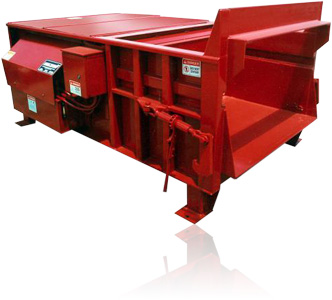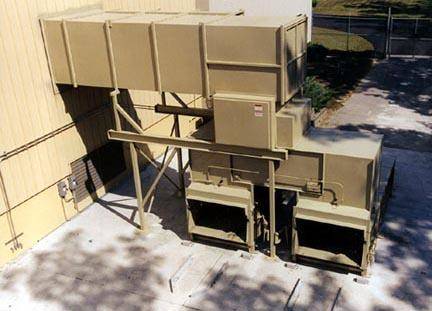How Industrial waste compaction equipment strengthens workplace efficiency
Wiki Article
Just How Waste Equipment Enhances Efficiency in Garbage Compactor Operations
Waste Equipment plays a vital function in boosting the performance of garbage disposal operations. By employing advanced sensors and automation, these systems boost compaction cycles and monitor load abilities efficiently. This integration not just preserves energy yet also reduces pick-up regularity and linked expenses. As organizations increasingly adopt these modern technologies, the ramifications for operational sustainability and management approaches come to be clearer. What various other advantages might emerge from these innovations in waste Equipment?The Role of Advanced Sensors in Compaction Performance
Advanced sensing units play a crucial duty in improving the efficiency of garbage compactors. These innovative gadgets keep track of various criteria, including load ability, wetness degrees, and compaction cycles, enabling real-time changes. By precisely gauging the quantity of waste, sensing units make it possible for compactors to enhance their procedure, making certain that power usage is lessened while maximizing the quantity of waste refined.Additionally, progressed sensors add to predictive upkeep by identifying prospective issues prior to they result in Equipment failure. This aggressive technique not just minimizes downtime but also extends the life-span of the compactor. In addition, information accumulated from these sensing units can be analyzed to enhance functional methods, leading to improved waste management techniques. In general, the integration of innovative sensing units in garbage disposal considerably enhances their performance and functional efficiency, converting into price savings and a more lasting method to garbage disposal.
Longevity and Design: Products That Issue
The toughness and design of garbage compactors hinge significantly on the materials used in their building and construction. Top quality steel is frequently the main choice, offering stamina and resistance to damage. This robust product withstands the immense pressure put in throughout compaction, ensuring durability and reliability. In addition, parts such as hydraulic systems are normally crafted from corrosion-resistant alloys to avoid destruction over time, boosting operational efficiency.Style additionally plays a vital function in capability; ergonomic forms and strategic supports can significantly influence performance. Producers frequently prioritize modular styles, enabling easier upkeep and repairs. Additionally, innovations in coating innovations, such as powder finish, boost resistance to environmental variables, including dampness and chemicals. Eventually, the cautious option of products not only boosts the structural honesty of garbage compactors but also adds to their general efficiency and efficiency in waste management operations.
Automation and Smart Technology in Waste Equipment

Moreover, automated compactors can enhance compaction cycles based upon the volume of waste, maximizing room and enhancing operational effectiveness. Combination with mobile applications allows users to monitor and control compactors from remote locations, enhancing benefit and responsiveness. By adopting these innovations, waste administration firms can not only enhance their functional operations yet also add to more lasting techniques by decreasing waste Homepage and maximizing source use. Overall, automation and clever technology stand for a considerable jump forward in the efficiency of garbage compactor procedures.
Data Analytics for Maximizing Waste Management
Utilizing information analytics provides waste monitoring business a powerful tool for optimizing operations and boosting efficiency. By gathering and analyzing data from different resources, such as compactor efficiency metrics and waste generation patterns, firms can get useful insights. These understandings allow them to make educated decisions concerning collection timetables, compactor usage, and upkeep demands.Anticipating analytics can forecast waste generation patterns, enabling business to designate resources a lot more successfully and prevent possible overflows or underutilizations of Equipment. Real-time tracking with information analytics also improves the capability to respond swiftly to operational challenges, decreasing downtime and boosting solution dependability.
In addition, integrating information analytics with existing waste management systems cultivates a culture of continuous improvement. By tracking and determining inefficiencies performance over time, firms can fine-tune their processes and take on finest practices, my review here eventually resulting in a more efficient and sustainable waste management strategy.
Price Cost Savings Through Improved Functional Effectiveness
By streamlining operations and reducing waste, firms can attain significant cost financial savings in their waste monitoring procedures. Enhanced operational performance in trash compactors minimizes the frequency of pick-ups, causing lower transportation prices. Additionally, advanced waste Equipment permits for maximum compaction, taking full advantage of container capacity and decreasing the requirement for added bins.This enhanced effectiveness not only lowers garbage disposal fees however also expands the lifespan of Equipment, lowering maintenance prices. Automated surveillance systems provide real-time information, permitting for positive changes in waste handling, which can furthermore boost performance and lessen unintended expenses.
In addition, robust training programs for staff on Equipment use can lead to enhanced operational methods, additionally driving down prices. Inevitably, the integration of reliable waste Equipment promotes a cost-effective waste management technique that profits firms financially while making sure smoother procedures.
Ecological Influence: A Lasting Approach to Waste Monitoring

Carrying out recycling efforts along with compaction processes enables business to draw away products from garbage dumps, promoting circular economy concepts. Organizations that embrace environmentally pleasant practices not only improve their business duty however additionally interest increasingly eco-conscious customers. By focusing on sustainability in waste monitoring, companies can attain a twin advantage: improving operational effectiveness while actively contributing to ecological preservation. This balanced method placements businesses as leaders in sustainable practices, fostering a healthier planet for future generations.
Regularly Asked Questions
How Commonly Should Waste Equipment Be Preserved for Ideal Performance?
The frequency of maintenance for waste Equipment typically depends on use and manufacturer referrals - Industrial waste compaction equipment. Generally, evaluations ought to happen quarterly, with extensive maintenance yearly to assure peak efficiency and prevent possible malfunctions or ineffectivenessWhat Kinds Of Waste Can Be Refined in Garbage Compactors?
Garbage disposal can process different sorts of waste, including cardboard, paper, plastics, and non-hazardous food waste. Users need to prevent compacting hazardous products, metals, and fluids to ensure reliable and risk-free operation.Exist Security Functions in Modern Trash Compactors?
Modern garbage disposal often consist of security features such as automated shut-off mechanisms, emergency quit buttons, and sensing unit systems (Industrial waste compaction equipment). These enhancements are designed to safeguard users from possible threats during operation, promoting a safer working settingJust How Does Waste Equipment Influence Labor Requirements?
The effect of waste Equipment on labor demands is substantial; it commonly decreases the need for hands-on labor, improving procedures and improving performance. Subsequently, fewer workers are required, allowing organizations to assign resources a lot more successfully.What Is the Average Life Expectancy of a Garbage Compactor?
The ordinary lifespan of a garbage compactor generally varies in between 10 to 15 years, relying on usage, maintenance, and environmental aspects. Normal maintenance can expand this lifespan, making sure optimal efficiency and dependability throughout its operational years.By embracing these innovations, waste administration companies can not only enhance their operational workflows yet likewise add to more sustainable methods by minimizing waste and maximizing resource usage. By enhancing procedures and minimizing waste, business can achieve substantial price savings in their waste monitoring procedures. Sustainable waste management approaches, particularly in garbage compactor procedures, add substantially to reducing land fill waste and reducing carbon footprints. Modern waste Equipment is made to optimize compaction, thus decreasing the quantity of waste requiring disposal. Trash compactors can process different types of waste, consisting of cardboard, paper, plastics, and non-hazardous food waste.
Report this wiki page